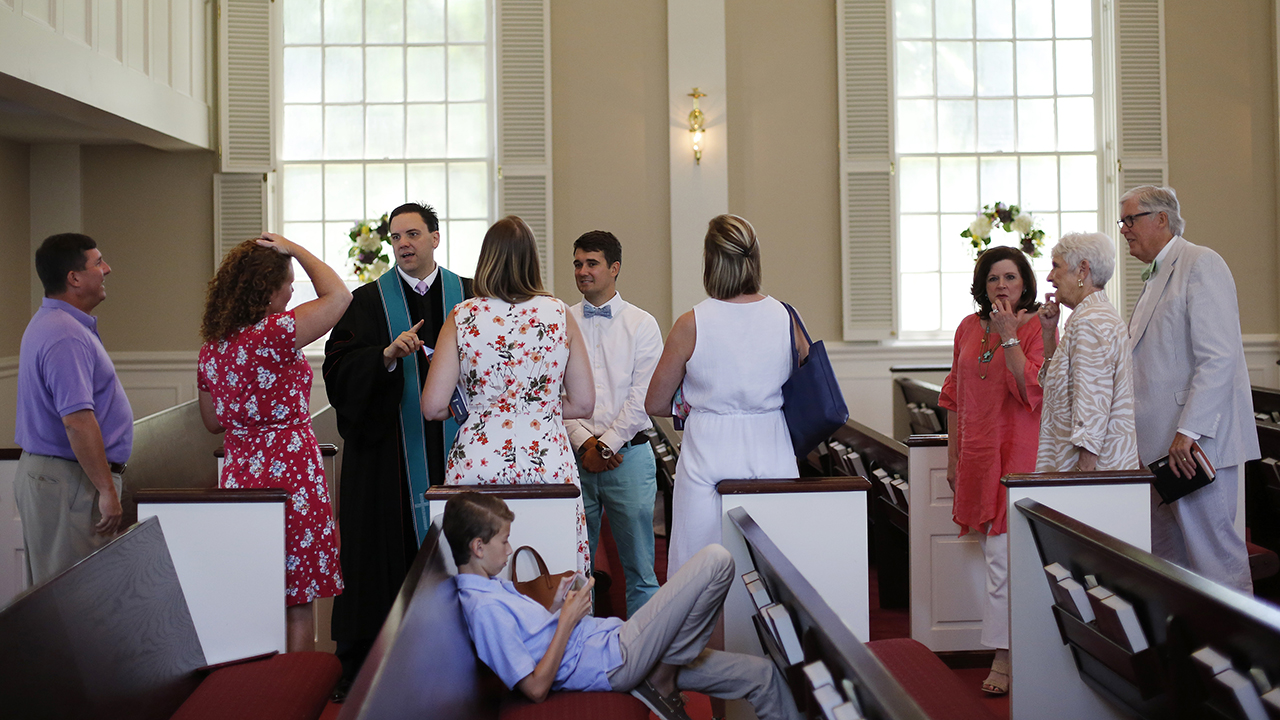
A large majority of Americans feel that religion is losing influence in public life, according to a 2019 Pew Research Center survey. While some say this is a good thing, many more view it as a negative development, reflecting the broad tendency of Americans to see religion as a positive force in society.
At the same time, U.S. adults are resoundingly clear in their belief that religious institutions should stay out of politics. Nearly two-thirds of Americans in the new survey say churches and other houses of worship should keep out of political matters, while 36% say they should express their views on day-to-day social and political questions. And three-quarters of the public expresses the view that churches should not come out in favor of one candidate over another during elections, in contrast with efforts by President Trump to roll back existing legal limits on houses of worship endorsing candidates.1
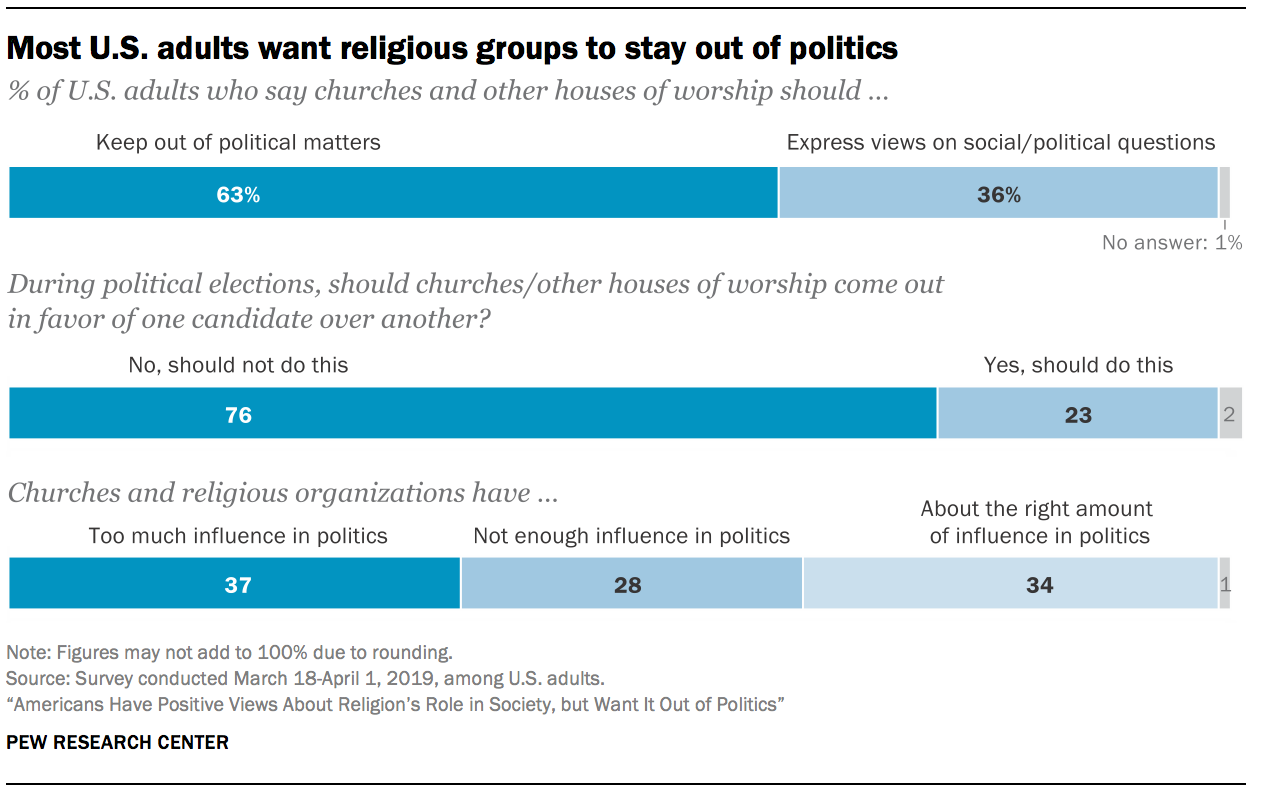
In addition, Americans are more likely to say that churches and other houses of worship currently have too much influence in politics (37%) rather than too little (28%), while the remaining one-third (34%) say religious groups’ current level of influence on politics is about right.
On balance, U.S. adults have a favorable view about the role religious institutions play in American life more broadly – beyond politics. More than half of the public believes that churches and religious organizations do more good than harm in American society, while just one-in-five Americans say religious organizations do more harm than good. Likewise, there are far more U.S. adults who say that religious organizations strengthen morality in society and mostly bring people together than there are who say that religious organizations weaken morality and mostly push people apart. On all three of these questions, views have held steady since 2017, the last time the Center measured opinions on these issues.
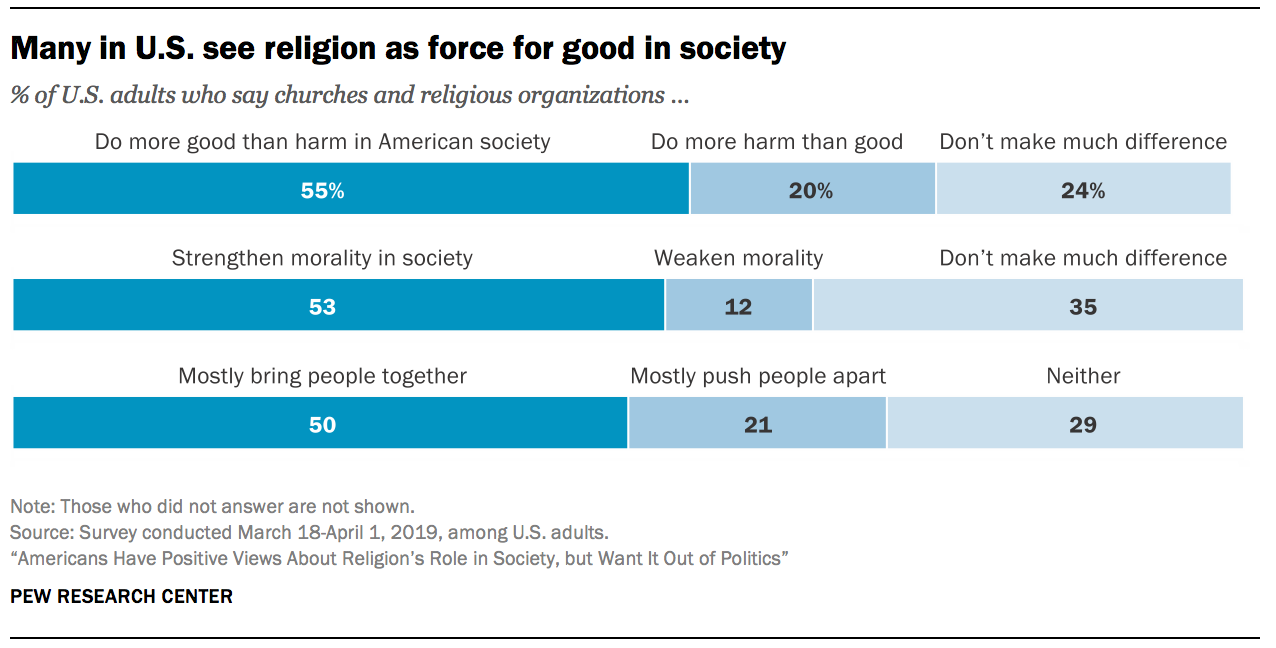
The survey also shows that roughly four-in-ten U.S. adults – including a majority of Christians – lament what they perceive as religion’s declining influence on American society, while fewer than two-in-ten say they think religion is losing influence in American life and that this is a good thing. In addition, roughly two-thirds of the public believes that religious leaders in general have high or very high ethical standards, and a larger share of Americans who attend religious services at least a few times a year say this about the clergy in their own congregations. Among these U.S. adults who attend religious services, majorities express at least “some” confidence in their clergy to provide useful guidance not only on clearly religious topics (such as how to interpret scripture) but also on other matters, such as parenting and personal finance (see Chapter 2).
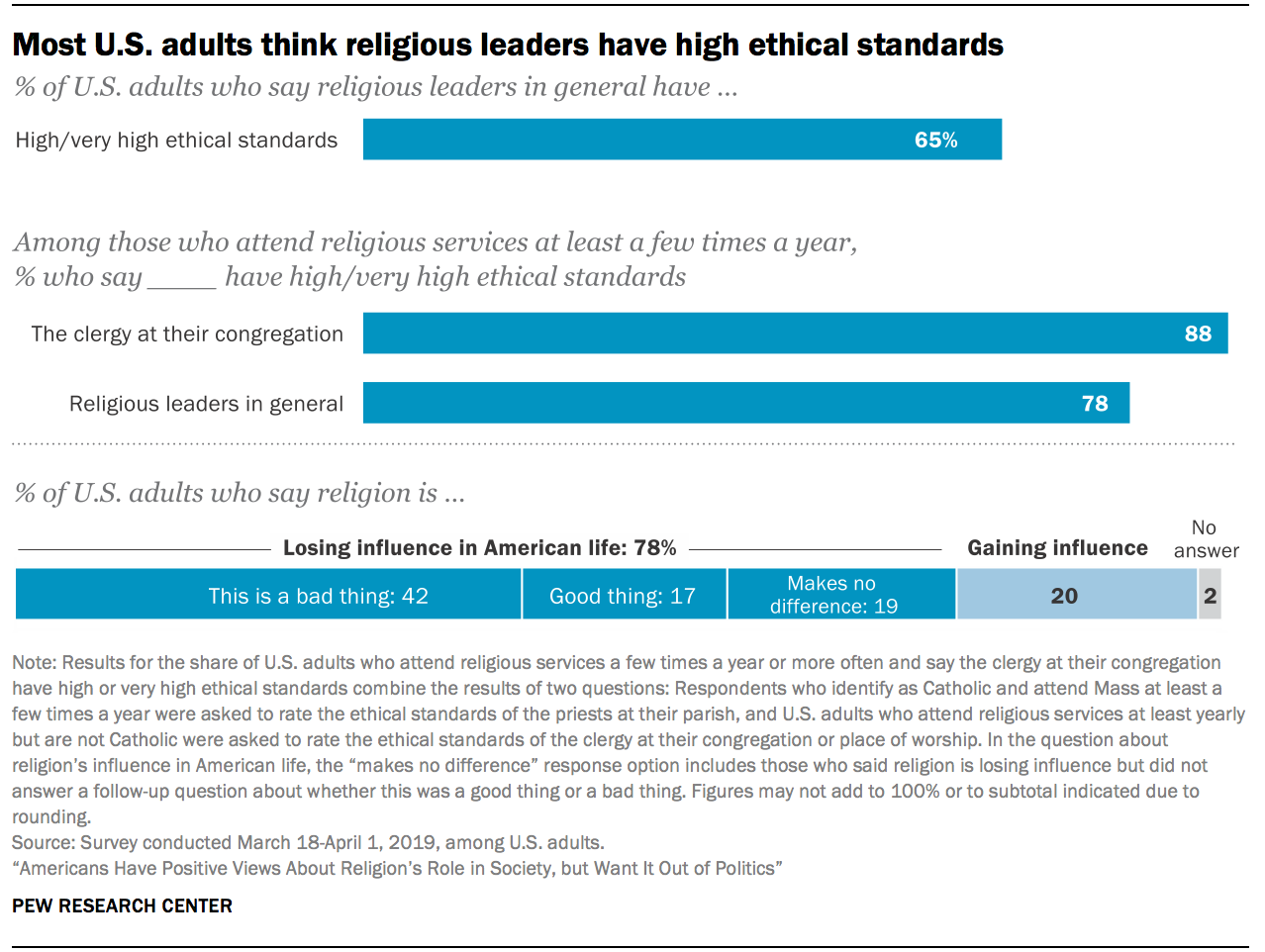
These are among the key findings from a nationally representative survey of 6,364 U.S. adults conducted online from March 18 to April 1, 2019, using Pew Research Center’s American Trends Panel. The margin of sampling error for the full sample is plus or minus 1.7 percentage points. Many of the questions in the survey were asked only of U.S. adults who attend religious services a few times a year or more often; results for that group have a margin of error of plus or minus 2.4 percentage points.
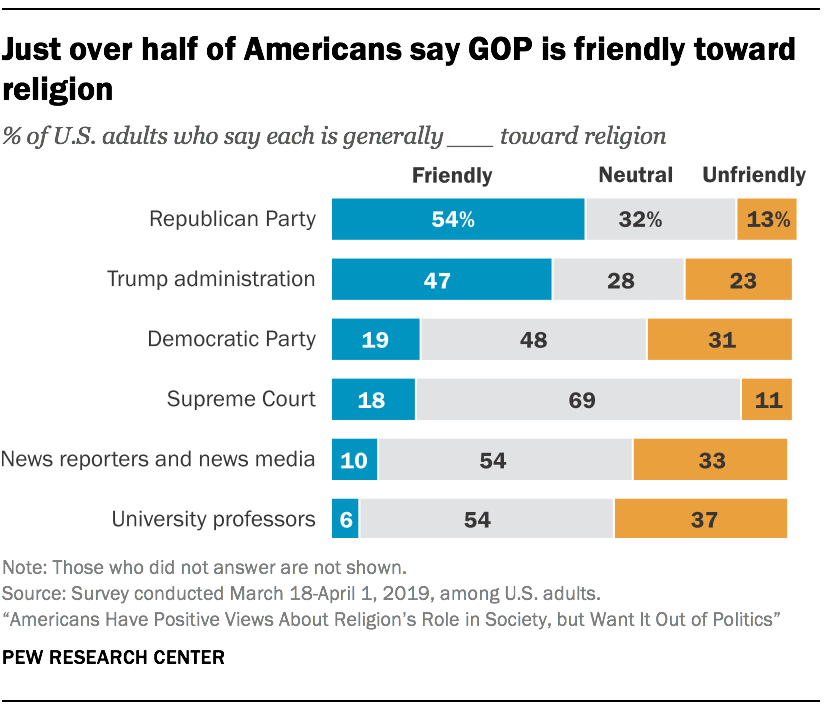
The survey, part of an ongoing effort by the Center to explore the role of trust, facts and democracy in American society, was designed to gauge the public’s views about many aspects of religion’s role in public life, as well as asking how much U.S. adults trust clergy to provide various kinds of guidance, what messages Americans receive from their clergy about other religious groups, how satisfied they are with the sermons they hear, how close they feel to their religious leaders, and whether they know – and share – the political views of the clergy in their houses of worship.
The survey shows that slightly more than half of U.S. adults say that the Republican Party is friendly toward religion (54%), while just under half say the same about the Trump administration (47%). Far fewer say these two groups are unfriendly toward religion. Other major societal institutions are viewed by majorities or pluralities of the public as neutral toward religion; for instance, roughly seven-in-ten U.S. adults say the Supreme Court is neutral toward religion.
Equal shares say that reporters and the news media (54%) and university professors (54%) are neutral toward religion, and 48% say this about the Democratic Party. In each of these cases, however, Americans are considerably more likely to say these groups are unfriendly toward religion than to say they are friendly. For instance, more than one-third of the public (37%) says university professors are unfriendly to religion, while just 6% say professors are friendly to religion.
On balance, Republicans and Democrats mostly agree with each other that the GOP is friendly toward religion. They disagree, however, in their views about the Democratic Party; most Republicans and those who lean toward the Republican Party say the Democratic Party is unfriendly toward religion, while most Democrats and those who lean to the Democratic Party view their own party as neutral toward religion.
Partisan differences in views toward religion in public life
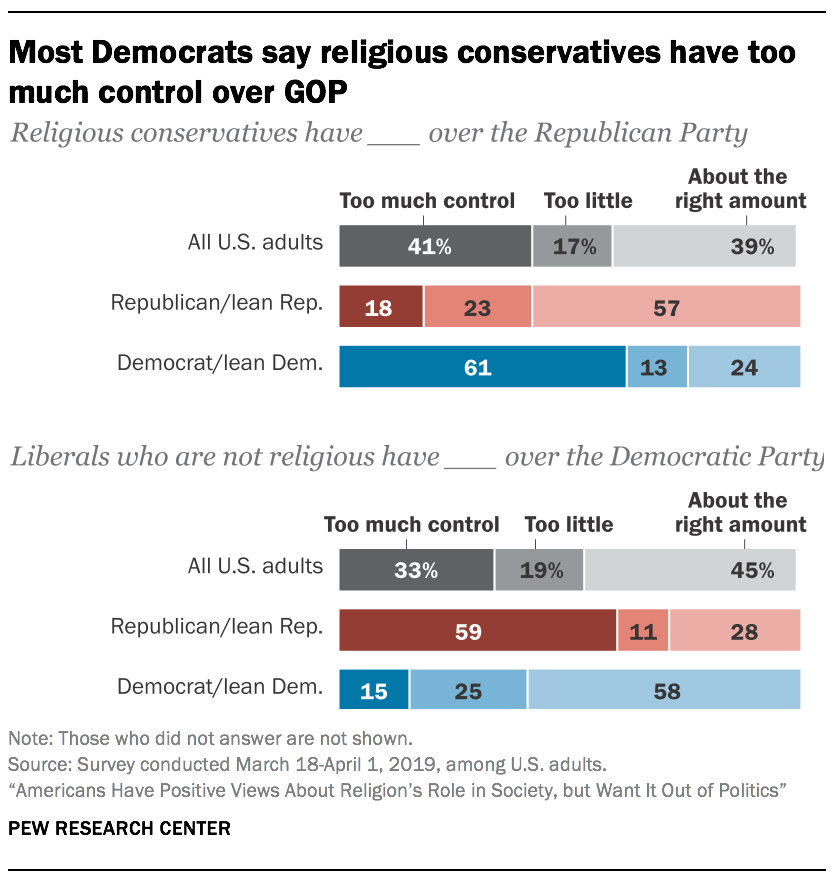
The survey also finds that four-in-ten U.S. adults (including six-in-ten among those who identify with or lean toward the Democratic Party) think religious conservatives have too much control over the Republican Party. At the same time, one-third of Americans (including six-in-ten among those who identify with or lean toward the GOP) say liberals who are not religious have too much control over the Democratic Party.
More broadly, Republicans and Democrats express very different opinions about religion’s impact on American public life. Seven-in-ten Republicans say churches and religious organizations do more good than harm in the U.S., and two-thirds say these institutions strengthen morality in American society and mostly bring people together (rather than push them apart). On all three of these measures, Democrats are less likely to share these positive views of religious organizations.2
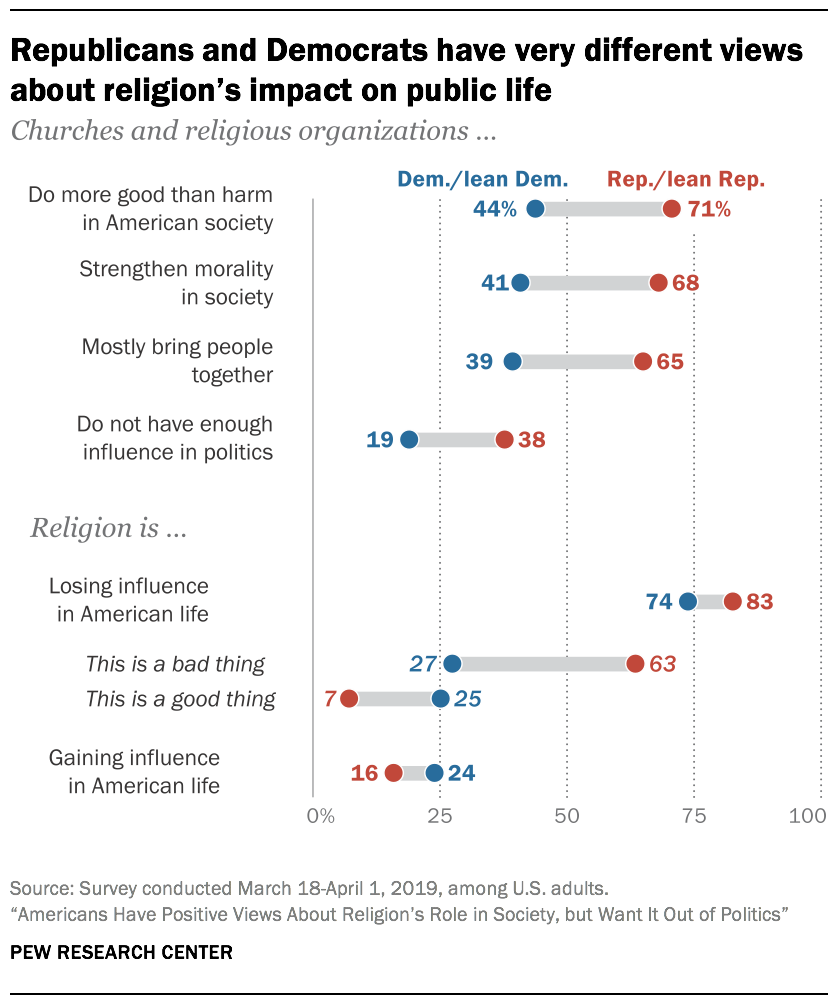
Furthermore, most Republicans say religion either has about the right amount of influence (44%) or not enough influence (38%) in the political sphere, while a slim majority of Democrats say that religion has too much influence in politics (54%). And although most Republicans and Democrats (including those who lean toward each party) agree that religion is losing influence in American life, Republicans are far more likely than Democrats to view this as a regrettable development (63% vs. 27%). There are about as many Democrats who say religion’s decline is a good thing (25%) as there are who say it is a bad thing (27%), with 22% of Democrats saying religion’s declining influence doesn’t make much difference either way.
Feelings about religion vary among Democrats based on race and ethnicity
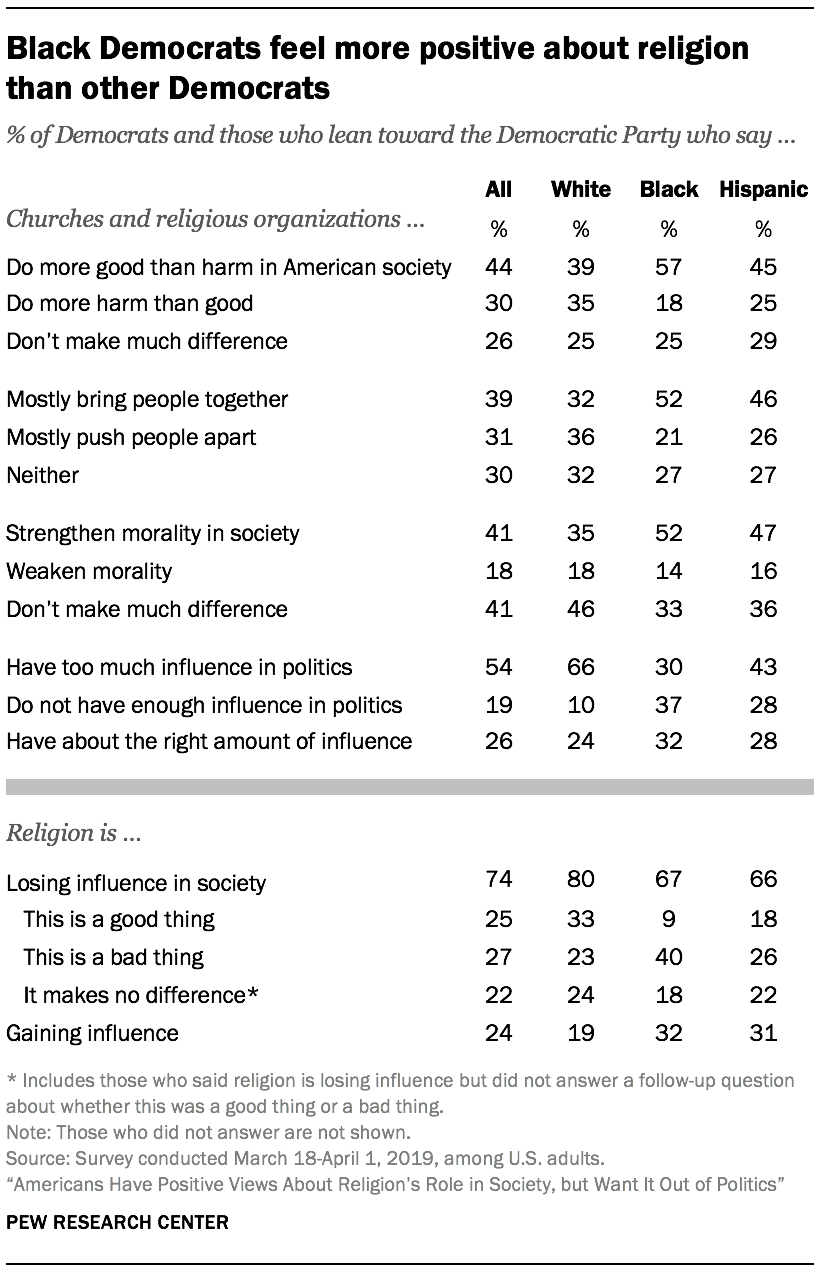
There are stark racial differences among Democrats and those who lean toward the Democratic Party in views on religion’s role in society: Black Democrats consistently express more positive views of religious institutions than do white Democrats. For example, half or more of black Democrats say churches and religious organizations do more good than harm in American society, mostly bring people together (rather than push them apart), and strengthen morality in society. White Democrats are substantially less inclined than black Democrats to hold these views.
In addition, two-thirds of white Democrats say churches have too much political power, compared with only three-in-ten black Democrats and four-in-ten Hispanic Democrats who say this. In fact, black Democrats are just as likely as white Republicans to say churches do not have enough influence in politics (37% each).3 And while one-third of white Democrats (33%) say that religion is losing influence in society more broadly and that this is a good thing, far fewer black (9%) and Hispanic (18%) Democrats agree.
Americans who attend religious services largely satisfied with political talk by clergy
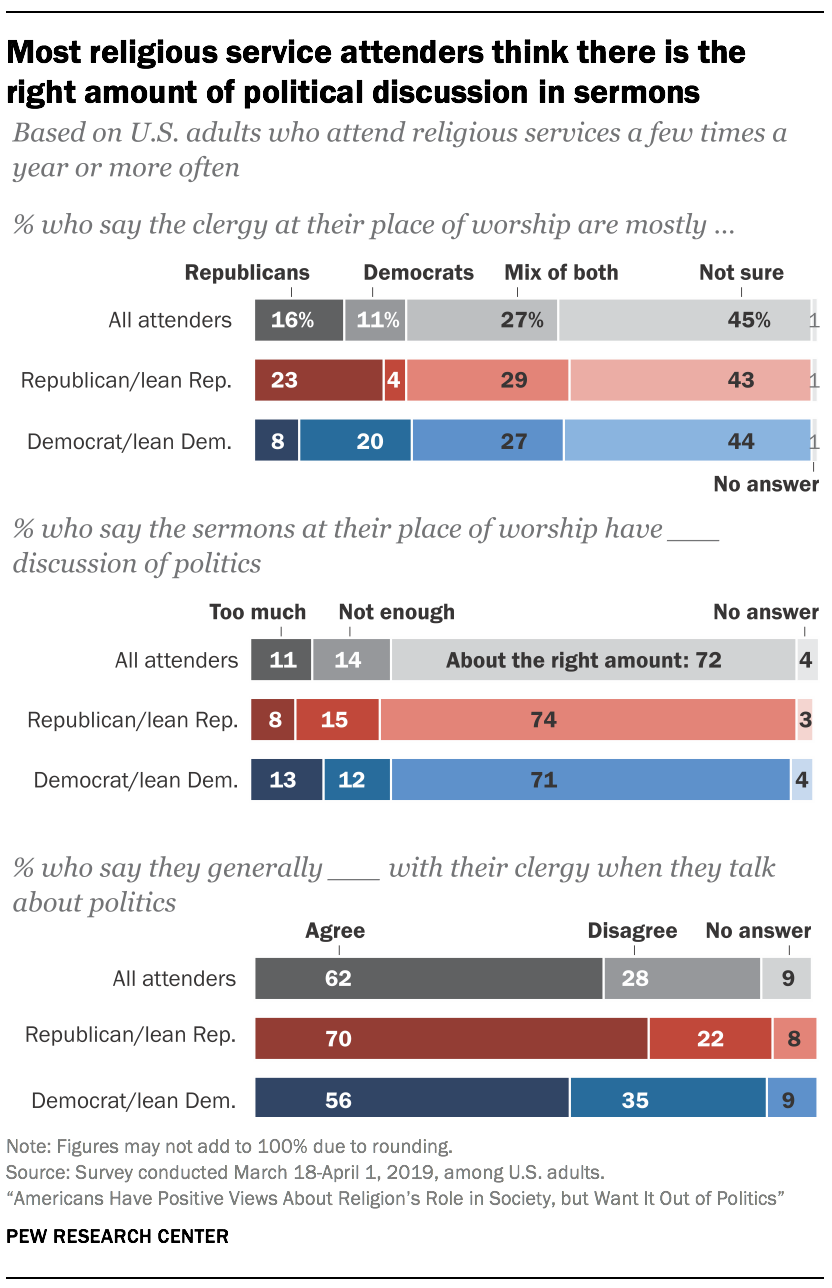
The survey also sought to gauge people’s perceptions about the politics of their clergy, finding that relatively few Americans say their clergy are united on one side of the partisan divide. In fact, many Americans who attend religious services at least a few times a year say they are unsure of the party affiliation of the clergy at their place of worship (45%), while about one-in-four say their clergy are a mix of both Republicans and Democrats (27%).4 When those who attend religious services think they know their leaders’ party affiliation, slightly more say their clergy are mostly Republicans (16%) than say they are mostly Democrats (11%).
Among partisans, few say their clergy are mostly members of the opposite party. For example, among those who attend religious services at least a few times a year and identify with or lean toward the Republican Party, just 4% say their clergy are mostly Democrats, while 23% say they are Republicans. Similarly, among Democrats and Democratic leaners, 8% say their clergy are Republicans, while 20% say their clergy are Democrats. Among both groups, most say they are unsure of the political leanings of their clergy, or say that there is a mix of both Republicans and Democrats in the religious leadership of their congregation.
Most attenders – including majorities in both parties – are satisfied with the amount of political discussion they’re hearing in sermons. About seven-in-ten say the sermons at their place of worship have about the right amount of political discussion, while 14% say there is not enough political talk and 11% say there is too much political talk in the sermons they hear.
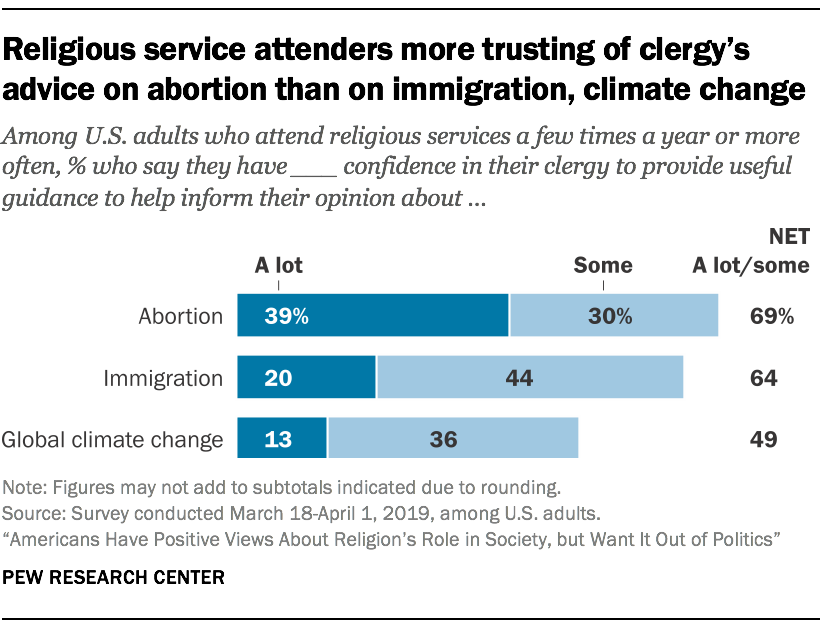
Furthermore, congregants tend to agree with their clergy when politics is discussed: Overall, about six-in-ten say they generally agree with their clergy about politics (62%), although Republicans are more likely than Democrats to say this (70% vs. 56%).
The survey asked those who attend religious services at least a few times a year the extent to which religious leaders help inform their opinion about three social and political issues: abortion, immigration and global climate change. Four-in-ten religious service attenders have a lot of confidence in their clergy to provide useful guidance to inform their opinion on abortion. Smaller shares have a lot of trust in their clergy’s guidance about immigration (20%) or global climate change (13%).
Republican attenders are much more likely than Democrats who go to religious services to say they have a lot of confidence in their clergy to provide guidance about abortion (53% vs. 25%). Catholics are consistently less likely than Protestants – particularly evangelical Protestants – to say they trust their clergy on all three issues. On abortion, for example, 34% of Catholics say they have a lot of trust in their clergy to provide guidance that helps form their opinion, compared with 46% of Protestants overall and 57% of evangelical Protestants who say this. Mainline Protestants (33%) and members of the historically black Protestant tradition (32%) look similar to Catholics on this question.
Other key findings from the survey include:
- Americans who attend religious services with any regularity express “a lot” of trust in the clergy or other religious leaders at their place of worship to provide advice about religious questions, such as growing closer to God or how to interpret scripture. They are more skeptical about advice from their religious leaders on other common life milestones and issues, such as marriage and relationships, parenting, mental health problems, and personal finances, although most express at least “some” confidence in their clergy to weigh in on these topics. And in general, Catholics are less likely than Protestants to say they trust their clergy to provide advice on these issues. (For more, see here.)
- Most adults who attend religious services a few times a year or more describe themselves as having at least a “somewhat close” relationship with the clergy at their place of worship, although respondents are much more likely to say they have a “somewhat close” relationship with their clergy (50%) than a “very close” one (19%). About three-in-ten say they are not close with the clergy at their congregation (29%). Just 8% of Catholics say they are very close with their clergy, a much lower share than in any other major U.S. Christian group analyzed. (For more, see here.)
- Many U.S. adults hear messages about religious groups other than their own from their clergy or other religious leaders. About four-in-ten religious service attenders have heard their clergy speak out about atheists (43%), while slightly fewer have heard clergy speak out about Catholics or Jews (37% each). About one-third of attenders say they’ve heard their clergy mention evangelical Christians (33%) or Muslims (31%). In terms of the types of messages congregants are hearing from their clergy, the messages about atheists tend to be more negative than positive, while the sentiments toward Jews are mostly positive.5 (For more, see here.)
- When searching for information about their religion’s teachings, religiously affiliated adults say scripture is the most trusted source. Six-in-ten U.S. adults who identify with a religious group say they have “a lot” of confidence in the information they’d find in scripture, and an additional three-in-ten say they have “some” confidence in this source. Four-in-ten would have a lot of confidence in the clergy at their congregation to give information about religious teachings. Fewer place a high level of trust in family, professors of religion, friends, religious leaders with a large national or international following, or information found online. (For more, see here.)
- Most Americans (66%) say religious and nonreligious people generally are equally trustworthy, while fewer think religious people are more trustworthy than nonreligious people (21%) or that nonreligious people are the more trustworthy ones (12%). Majorities across religious groups say religious and nonreligious people are equally trustworthy, but evangelical Protestants are more likely than others to say religious people are especially trustworthy, and self-described atheists are particularly likely to put more trust in nonreligious people. (For more, see here.)
- When U.S. adults find themselves in an argument about religion, most say they approach the conversation in a nonconfrontational manner. About six-in-ten say that when someone disagrees with them about religion, they try to understand the other person’s point of view and agree to disagree. One-third say they simply avoid discussing religion when a disagreement arises, and only 4% say they try to change the other person’s mind. (For more, see here.)
The remainder of this report examines the public’s views about religion in public life and religious leaders in further detail, including differences in opinions across religious groups. Chapter 1 looks at Americans’ views about religion in public life. Chapter 2 explores levels of confidence in clergy (and other clergy-related opinions) held by Americans who attend religious services at least a few times a year. And Chapter 3 looks at religion’s role in some of Americans’ interpersonal relationships, including levels of trust in religious and nonreligious people.
